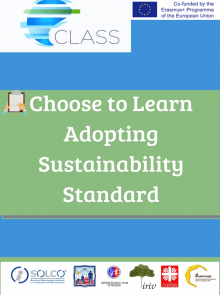CLASS an ebook for educators to combat Early School Leaving (ESL)
Bénédicte Halba (ed) et Laura Caronna, Antonia Castellan, Anastasia Ciavattella, Ermelinda De Carlo, Bénédicte Halba, Marijan Renić
The main findings of PISA 2018 (European Union, 2019) for the EU education systems underline that the EU has not met its ET2020 benchmark on underachievement as one in five 15-yar-olds in the EU (21.7% in reading, 22.4% in mathematics and 21.6% in science) are underachievers. There are wide differences among Member States. The same remark can be made for the rate of Early School Leaving (ESL) according to the last statistics published by the European Commission (Eurostat, 2021). In 2020, 11.8 % of young men and 8.0 % of young women in the EU were early leavers from education and training. In the countries gathered by the CLASS project, the expected threshold (an ESL rate below 10%) is achieved for France, Germany and Portugal but not yet for Italy.
The innovative approach suggested by the CLASS project is to tackle the issues faced by pupils by gaining self-confidence - and so be better equipped faced to bullying- but also by enhancing empowerment with the feeling of belonging to a community thanks to meaningful activities. Volunteering is a way to acquire an informal and non-formal learning and the competences attached to it, to be more self-confident by implementing actions on the ground for others, and to enhance active citizenship. In the four countries involved in the CLASS we could assess the very positive impact of voluntary activities on the pupils.
Youth volunteering has become a main priority in Youth policies since the European Voluntary Service (ESV) launched in the late 1990s as it may be a fundamental step for young people to prepare a social and professional life: feeling useful for the community, meeting people they wouldn’t have had the chance to meet in their life (iriv, 2001). The link with competence by considering a voluntary activity as a non-formal and informal learning was made with the first portfolio designed to identify and assess a voluntary experience (iriv, 2007). During the European Year of Volunteering (EYV2011), a voluntary experience was officially recognised as a meaningful learning for youngsters, and adults.
The CLASS project brings its own stone to the wall. This is a never-ending process as youngsters are faced to changing and troubling times. The coronavirus has dramatically increased inequalities among youngsters. The socio-economic background negatively affects pupils’ performance and their academic expectations in most European countries. The gap is still too high between pupils from advantaged and disadvantaged socio-economic background. A migrant background also affects negatively the performance.
The CLASS project brings some “points of lights” to pave the way for a successful future for youngsters in Europe, whatever the socioeconomic background, advantaged or disadvantaged, or migrant background. This is a matter of equity of chances but also of social justice.






























































